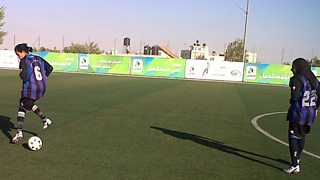Game changer
Lana Shehadeh
Research Officer for 主播大秀 Media Action in the Palestinian Territories
Tagged with:

TV show Voices From Palestine hears from Waed Abu-Ktesh, a young Palestinian woman who鈥檚 formed the first all female football team in her refugee camp.
"If we lived somewhere else we would be fine. But here things are difficult. We live under Israeli occupation on one hand, while on the other we are surrounded by very conservative Palestinians. Palestinians here are not accustomed to young women wanting to play football," says Waed Abu Ktesh, as she juggles a football in her hands.
The energetic 22-year-old lives in Al-Jalazone refugee camp, seven kilometres north of Ramallah city. I met her recently while filming interviews for 主播大秀 Media Action’s debate show . Waed told me she decided to form an all women’s football team to break away from her society’s restrictions on women.
Aged between 18-24, the 14 women train twice a week and start their practice by meeting at the camp gate and then walking down the street and past Beit El settlement and the villages of Ein Senia and Jifna.
"We have not dared to jog as a warm-up," Waed says. "We are taking baby steps to get the camp accustomed to our training. Once they are more comfortable with a large group of women walking, we may introduce jogging," she laughs, finding humour in their enforced slow start.
Sporting freedom
The team then heads to Ramallah by bus, where they train in a proper football field. Once they get to the football field, they have complete privacy to play, run around and shout during practice. Waed says that some of the girls even get the chance to play without their headscarves because there are no men present or close enough to see.
"Most people don’t like how we dress, the trousers and fitted shirts. They don’t realise it helps us move easier," she says.
Waed was able to get shirts, shorts and trousers for her teammates from a local non governmental organisation. Those in the team who have chosen the option of shorts are also given long socks for protection and to cover their legs. She says that such measures are taken so that she can avoid gossip in the refugee camp.
Worlds apart
Al-Jalazone refugee camp is a neighbour to one of the well-known Israeli settlements in the West Bank, Beit El. Beit El is also home to the Israeli Civil Administration for the Occupied Palestinian Territories. Established in 1977, Beit El houses approximately 5,600 Israeli settlers on approximately 1,528 dunams of land (1.528 km2). Beit El is a fully equipped city for Israelis to enjoy different recreational activities whether male or female.
Al-Jalazone Refugee Camp on the other hand, is one of the many refugee camps formed by the United Nations Relief and Works Agency (UNRWA) on land leased by Jordan following the 1948 war. Al-Jalazone houses approximately 14,500 Palestinian refugees on approximately 253 dunams of land (.25 km2).
And Al-Jalazone has its own set of issues which young people like Waed have to deal with.
Culture in the Palestinian Territories
"Our families are always worried about what people say. My Dad always says, 'What do you think people will say about me? Don't you care about your father’s honour?' But I just tell him a joke, make him laugh and he forgets," adds Waed, with a giggle.
A local village elder explained to me that Palestinian society is gradually changing, but many of the surrounding villages and refugee camps are still predominately patriarchal societies. Most people have began to accept women attending college and pursuing certain careers; but practicing outdoor sports and being very active in society remains taboo.
Waed told me that if she was given the opportunity to emigrate to Europe or the US, she would take that opportunity. There, she said, she could join an all-woman's football team and be an active member of a city council.
Women's rights in the Palestinian Territories
Waed represents a large portion of Palestinian women struggling to bring about change in the Palestinian territories. Forty nine per cent of the population in the West Bank and Gaza Strip, women are usually the main breadwinners due to the high rates of male political prisoners. Yet women still face a lot of prejudice.
In a future programme, will discuss women’s role in Palestinian society and hear more stories of young women like Waed.
Related links
More blogs from Lana Shehadeh:
